What Are The Best Lithium Boat Batteries On A Small Budget? (2023 Review)
UPDATED 11 MAY 2023
This article may contain affiliate links. If you make a purchase after clicking on a link we may earn a small commission at no extra cost to you.
While lithium marine batteries come with a long list of advantages compared to conventional lead acid batteries, they also have one major drawback: they have a much higher price.
So if you’re thinking about getting a lithium battery for your boat, it really helps to know which models are the most affordably priced, while still giving you access to the impressive advantages of lithium deep cycle batteries.
For this article my team and I tested the most affordably priced lithium marine batteries, and evaluated them on their run time, reliability, durability, and pricing.
Based on our testing, here is our pick of the cheapest lithium marine batteries in 2023:
- Best cheap 12V 50Ah option: ECO-WORTHY LiFePO4 12V 50Ah
- Best cheap 12V 100Ah option: CHINS LiFePO4 12V 100Ah
- Best cheap 24V 60Ah option: Moseworth LiFePO4 24V 60Ah
- Best cheap 24V 100Ah option: Ampere Time LiFePO4 24V 100Ah
- Best cheap 36V 60Ah option: Moseworth LiFePO4 36V 60Ah
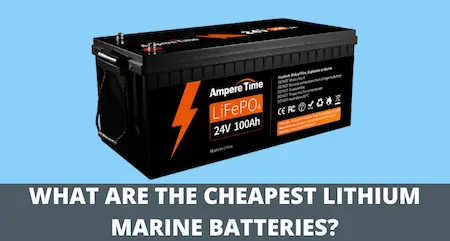
What is the cheapest lithium marine battery in 2023?
The table above compares the most important specs of the 7 cheapest lithium marine batteries on the market in 2023 that we tested.
Now let’s dive into the details, and examine each of these models more closely.
ECO-WORTHY LiFePO4 12V 50Ah
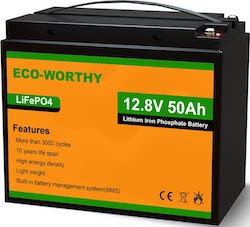
Our verdict: The ECO-WORTHY 12V 50Ah is the cheapest 12V 50Ah lithium marine battery

If you’re looking for a battery with relatively small capacity, then this Eco-Worthy is a very cost effective option to get access to the full advantages of a lithium ion battery, but without breaking the bank.
The Eco-Worthy comes with a built-in Battery Management System (BMS), and during our testing we found that this helps to monitor and adjust voltage and temperature of the battery.
When we tested it, we found that this is extremely useful if you want to avoid voltage peaks in the output current, which can damage sensitive electronic devices.
With a weight of less than 12 pounds, the Eco-Worthy is also significantly lighter than comparable lead acid batteries (which usually weigh around 20 to 30 pounds). Also, with 4000+ charging cycles, it provides an exceptionally high battery life.
Features:
- Automotive grade lithium ion cells
- 4000+ cycles
- Built-in BMS
- 5-year warranty
ECI POWER LiFePO4 12V 50Ah
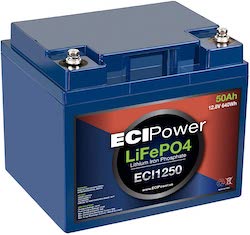
Our verdict: The ECI Power 12V 50Ah is the runner up cheapest 12V 50Ah lithium marine battery

The ECI Power 12V 50Ah provides a very high quality lithium ion battery at a competitive price. With built-in BMS it protects your devices from over-discharge, and helps to keep the output voltage steady.
While testing it, we found that due to its short charging time it’s easy to get the ECI Power fully charged before use, and you can also do opportunity charging at any time, since it doesn’t require complete discharge in order to be recharged.
Also, we discovered that it can be connected in parallel with up to 3 other batteries, which means you can adjust voltage easily by adding or subtracting battery banks.
Features:
- Built-in BMS
- 2000+ cycles
- Flat discharge curve
CHINS LiFePO4 12V 100Ah
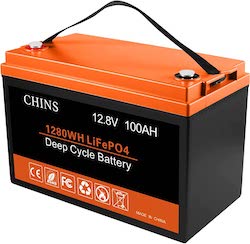
Our verdict: The CHINS 12V 100Ah is the cheapest 12V 100Ah lithium marine battery

If you’re looking for the extended runtime offered by a 100Ah lithium battery for your boat electronics, then this CHINS model offers the most affordably priced option in this category.
Our testing revealed that the built-in BMS protects the CHINS from overheating and from short circuit, as well as protecting your device(s) from excessive voltage peaks.
And with a weight of just 24 pounds, it weighs about one third of the weight of a comparable lead acid deep cycle battery.
Finally, we found that it can be used in parallel with multiple other banks, to increase voltage and capacity, which is great news if you want to be able to add more power to your battery system in future, depending on your needs.
Features:
- Built-in BMS
- 2000+ cycles
- 5 year warranty
Lossigy LiFePO4 12V 100Ah
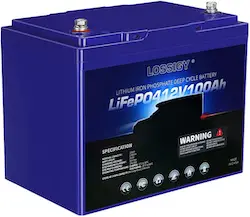
Our verdict: The Lossigy 12V 100Ah is the runner up cheapest 12V 100Ah lithium marine battery

After the Himassi model that we tested (see above), this Lossigy lithium iron battery is the least expensive 100Ah option currently available.
During our testing we found that one of its key strengths is the extended battery life, which lasts for more than 7000 charging cycles, making it one of the most cost effective lithium batteries tested in this article.
Similar to other lithium ion batteries, the Lossigy tolerates extremely deep discharges to levels over 90 to 95% of the total amp hour capacity, which is impossible to reach with lead acid batteries, which tend to cut off after just 50 to 60% discharge.
Features:
- 2000+ cycles
- Built-in BMS
- 5 year warranty
Moseworth LiFePO4 24V 60Ah
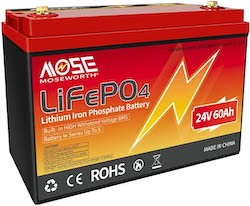
Our verdict: The Moseworth 24V 60Ah is the cheapest 24V 60Ah lithium marine battery

Sometimes it makes more sense to use a single 24 volt battery than two 12 volt batteries in series for a boat battery system.
The most common reason for this is lack of space on a small boat, kayak, or canoe. If that’s the case for you, then this Moseworth model is the least expensive 24 volt lithium marine battery on the market.
An additional advantage that many people don’t think about is that a single 24 volt battery can actually come at a lower cost than two 12 volt batteries, which means you’re also saving money, in addition to saving on space and weight.
Finally, an additional consideration is that due to the higher voltage, you can get more runtime out of a lower amp hour capacity, and so can get a whole day of runtime out of a 60Ah battery.
Features:
- 3000+ cycles
- Built-in BMS
- Rope handle
Ampere Time LiFePO4 24V 100Ah
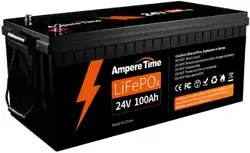
Our verdict: The Ampere Time 24V 100Ah is the cheapest 24V 100Ah lithium marine battery

This Ampere Time model is a great option if you’re looking for a 24 volt lithium deep cycle battery that doesn’t break the bank.
It’s good to keep in mind that getting one 24V 100Ah battery comes considerably cheaper than getting two 12V 100Ah models.
That way you not only save on space and weight, but also get a more affordable price, while getting the full benefits of a lithium battery system.
When we put it to the test, we found that another advantage of this Ampere Time model is that it comes with IP6 grade waterproofing, which helps to extend battery life even when exposed regularly to water in a boat.
However, if used in a saltwater environment, we found that you need make sure to wipe it off with a a moist cloth afterwards, in order to avoid corrosion.
Features:
- 4000+ cycles
- Automotive grade Li iron cells
- Built-in BMS
- IP6 waterproofing
Moseworth LiFePO4 36V 60Ah
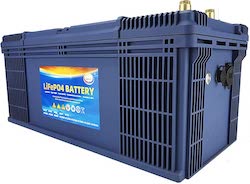
Our verdict: The Flypower 36V 60Ah is the cheapest 36V 60Ah lithium marine battery

With 36V and 100Ah, this Flypower is the biggest lithium boat battery that we tested, so it may come as a surprise that it is so affordable.
This is in contrast to most other models in this category, which tend to be over this price point.
And similar to the advantage of getting a 24V model instead a 12V model (of which you would have to set up 2 in parallel), the money you save by getting a single 36V battery instead of three 12V models makes it well worth it to go this route.
Features:
- 3000+ cycles
- Built-in BMS
- Short charging time
What are the advantages of lithium marine batteries?
Marine deep cycle batteries have traditionally been sealed lead acid (SLA) batteries, but in recent years there has been an increasing move towards using lithium deep cycle batteries, even though they are considerably more expensive.
So why are boat owners adopting lithium boat batteries instead of regular lead acid models? The answer is that lithium ion batteries provide a number of key advantages over their lead acid counterparts.
On average, when we put them to the test, we found that the charge of a lithium deep cycle boat battery lasts 50% to 100% longer than that of a comparable lead acid battery. And since they are also significantly lighter than lead acid batteries, this means you’ll get a lot more runtime per pound of battery weight when using a lithium battery.
In addition to this key advantage, our testing shows that lithium deep cycle batteries can withstand many more charge/discharge cycles than SLA batteries, and because of this have a life expectancy that’s about 10 times longer than their lead acid counterparts.
Taken together, these advantages mean that you’re getting more bang for your buck with a lithium boat battery, even if the upfront cost is higher. And especially when you factor in the longer total lifespan, you’ll end up saving money in the long run with a lithium deep cycle boat battery.
Is it worth getting a lithium marine battery for your boat?
As mentioned above, lithium marine batteries offer several key advantages over conventional lead acid boat batteries. However, which battery type is best for your specific case depends on how much time you usually spend on the water.
If you’re the kind of boat owner who only goes out on the water for a few hours every now and then, you’ll be fine with regular lead acid batteries. However, if you go out with your boat very often, and like to spend the whole day on the water, you’ll be much better off getting a lithium marine battery for your boat.
How to choose a lithium deep cycle battery for your boat
When choosing a lithium marine battery for your boat, there are a few important factors to consider. First of all, you need to match the voltage of the device(s) that you want to power with the battery. For example, if you have a 12 volt trolling motor, you need to get a 12 volt battery.
Also, our testing revealed that the actual output voltage of lithium batteries is often 1 to 2 volt higher than their nominal voltage. So especially when using them for trolling motors, you need to be careful about this, since prolonged exposure to high voltages can damage the motor.
The best way to make sure that your battery is compatible with the device you want to power, is by checking the manufacturer’s spec sheet on whether the battery is compatible for use with that type of device. Also, if possible, look for a battery that has a built-in Battery Management System, which helps to avoid over-discharge and voltage peaks.
Secondly, you should choose a battery amp hour capacity that will keep your electronics running as long as you need them to. If you like to spend the whole day on the water, you’ll need a higher capacity than if you just go out for a short period of time.
When it comes to powering trolling motors specifically, aim for an amp hour capacity that’s equal to or higher than the pound thrust rating of your motor. Again, this is especially important if you want to use it for a whole day at a time.
Gear and methods used for testing
To get consistent testing results, we tested all of the lithium marine batteries covered in this article based on their ability to power a Lowrance Ghost trolling motor mounted on the bow of a Ranger Z520R bass boat. We chose this trolling motor because it can be powered either by three 12V batteries in tandem, or a single 24V or 36V battery, which allowed us to test all of the models this way.






